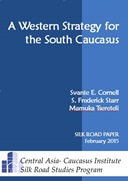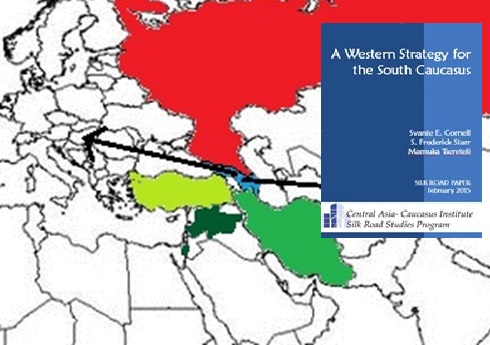 Executive Summary
Executive Summary
From a Western perspective, the Caucasus is far more important than its size alone would suggest. Its significance to the United States and Europe lies in its crucial geographical location. Its strategic importance derives from its location at the point of intersection between the key Eurasian powers of Russia, Iran and Turkey, and its central role in the burgeoning east-west transport corridor connecting Europe to Central Asia and beyond. The Caucasus is therefore key to any Western efforts to shape future interactions between Europe and the Middle East, and to Western commercial and strategic access to and from the heart of the Eurasian continent. At a time when the two most salient challenges to the transatlantic alliance are Russia’s aggressive expansionism and the Islamic radicalism emanating from the Middle East, the Caucasus is a strategically important pressure point in both directions: a bulwark against both Moscow and the Islamic radicalism of the Middle East. The Iranian theocracy’s continued efforts to expand its influence from Syria to Yemen, and the growing anti-Western authoritarianism with Islamist underpinnings in Turkey, further enhance the importance of this role.
These considerations alone should dictate a growing American and European engagement with the states of the Caucasus, but this has not occurred. Quite the contrary, Western influence in the region is at an all-time low. As Western influence has declined, and partly as a consequence of it, the region’s development has stagnated. This stagnation is evident in areas as diverse as security, energy, governance, and human rights. Meanwhile, new challenges to the region’s security and development have multiplied and strengthened, threatening its long-term viability and eroding important Western interests.
This situation is the result of a lack of strategic vision in the West and to a series of tactical errors. At the core of Western shortcomings in the Caucasus are serious flaws in the analytical lenses through which leaders and analysts perceive events in the region:
- A failure to grasp the changing nature and importance of the region’s unresolved conflicts, particularly their transformation into key components of Russian geopolitical maneuvers.
- A failure to grasp the nature of regional politics, succumbing too often to a simplistic schema of “government versus opposition,” when the real and relevant political divides have been equally within each of these groups.
- A failure to understand the inter-connection between security and democratic development, in particular the powerful negative effects of a worsened security situation on the prospects for internal political reform.
Compounding these analytical errors, several factors of a strategic nature have contributed to the West’s failures in the Caucasus.
- The failure to embrace a regional approach to the Caucasus, focusing instead on bilateral relationships; and subordinating these to the West’s ties with various regional powers.
- The failure to coordinate effectively legitimate interests in diverse areas, particularly between security and governance.
- The failure to grasp dynamic changes in the broader geopolitical environment, particularly internal changes in Russia and Turkey, which should enhance the potential role of the Caucasus in Western policy.
Western policymakers have also made serious mistakes that are operational in nature:
- Insufficient coordination between relevant governmental agencies in Western capitals and across the Atlantic.
- The assignment of the Caucasus and Central Asia to different organizational entities within Western governments has led to the neglect of Trans-Caspian connections.
- The resort to finger-pointing and hectoring in the promotion of democracy and human rights has been deeply ineffective, alienating governments rather than influencing them.
To remedy this situation, this paper calls for a new strategy toward the Caucasus. This strategy should rest on the following analytical components:
- All policies toward the Caucasus must be rooted in a regional rather than purely bilateral approach.
- Policies must be engineered in recognition of the diverse forms of Western interests in the region and must take into account the ways in which these interests interact with one another on the ground.
- Western powers should re-engage the region in the area of sovereignty and security, which will do more than anything else to pave the way for progress in other areas.
- The West cannot expect progress on governance and human rights without a clear commitment to security issues; conversely, the states of the Caucasus cannot expect Western support for their security without a commitment to governance and human rights.
On this basis, the paper offers the following proposals for a new Western approach to the region:
- Increase rhetorical and concrete support for the sovereignty, independence, and territorial integrity of all three of the regional states.
- Develop a substantial and sustained Western initiative on the Armenian-Azerbaijani conflict, including strong U.S. Government leadership from the top level and a willingness to bypass, if necessary, the Minsk process.
- Increase cooperation in defense and security.
- Provide Armenia a strategic alternative to the Eurasian Union.
- Seek ways to anchor Azerbaijan in the EU’s Eastern Partnership.
- Adapt policies to improve governance and human rights to changing realities, including greater emphasis on improving effectiveness and accountability on the part of governments.
- Support the trans-Caucasus transport corridor as a “Land Suez” connecting Europe with both India and China, focusing especially on the role of businesses and of soft infrastructure.
Improve and clarify intra-agency, inter-agency, as well as transatlantic coordination on issues relating to the Caucasus.

 By
By